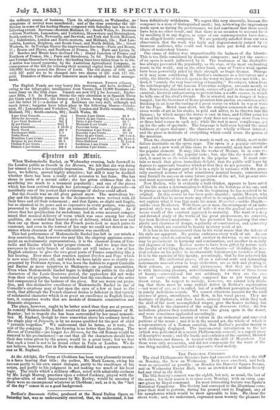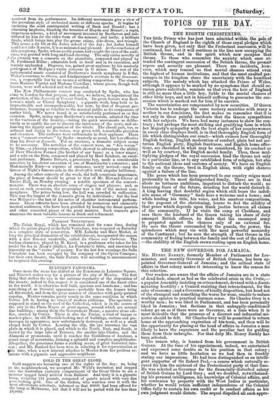TIIE PRINCIPAL CONCERTS.
The rival Philharmonic Societies have had concerts this week ; the 0141 on Monday, the New on Wednesday. Both were excellent, and both were as successful as possible : on Monday the Hanover Square Rooms, and on Wednesday Exeter Hall, were as crowded as if neither Society had any rival in the field.
The Old Society's concert was the eighth, but not, as usual, the last of the series ; for their season is to close next Monday, with an extra con- cert given by Royal command. Its most interesting feature was Spohr's Historical Symphony. The Society had conveyed to the illustrious com- poser their wish to perform, during his present visit to England, any of
received from its performance. Its different movements give a view of the prevalent style of orchestral music at different epochs. It begins by imitating the solid contrapuntal writing of Bach and Handel ; has a charming larghetto, blending the beauties of Haydn and Mozart ; a rapid, impetuous scherzo, a kind of movement invented by Beethoven and sub- stituted by him for the older form of the minuet; and lastly, a brilliant finale, which brings into play the grease caisse, side-drum, and triangle. This seems a sly bit at the Auber school of the day ; but Auber himself could not take it amiss, it is so animated and pleasant. At the conclusion of this symphony, Spohr, whose portly person had caught the eyes of the audi- ence, was greeted with long and loud cheering. The only entire novelty of the evening was a concerto on the pianoforte, composed and played by M. Ferdinand Hiller ; admirable both in itself and in its execution, and warmly applauded. Blagrove, too, gained great applause by his masterly perforinance of Molique's violin concerto in G minor. The rest of the instrumental music consisted of Beethoven's fourth symphony in B flat, Weber's overture to Oberon, and Lindpaintuer's overture to the Genueser- inn, a respectable but by no means a striking composition. The singers were Madame Viardot and Madame Castellan ; whose pieces, though well known, were well selected and well executed.
The New Philharmonic concert was conducted by Spohr, who has come to London for that purpose, and also, we believe, to superintend the production of his Jessonda at Covent Garden. Its great feature was Beet- hoven's ninth or Choral Symphony ; a gigantic work, long held to be impracticable and incomprehensible, but now, by dint of frequent per- formance, becoming as familiar to the musical public as its companions of earlier birth. We never heard it so satisfactorily performed as on this occasion. Spobr, acting upon Beethoven's own maxim, adapted the time to the vastness of the locality,—taking the quick movements so delibe- rately as to enable the ear to discern the intricacies of the score, and en- hancing the dignity and grandeur of the whole. The choral part, too, so arduous and trying to the voices, was given with remarkable precision and clearness. The audience were enthusiastic in their applause. There was a " concert-overture " by Spohr—masterly as usual, but less effective than his Faust or lessonda. For an overture, a dramatic subject seems to be necessary. The novelties of the concert were, an "Ave verum" by Silas,—a pleasin' composition, which showed to advantage the ability
F of Herr Theodore Formes (the brother of our basso) as a tenor singer; and a solo on the flute, composed and played by Herr Reichert, an excel- lent performer. Master Barnett, a precocious boy, made a considerable sensation by his clever execution of one of Mendelssohn's concertos ; and Mademoiselle Biiry—a soprano of eminence, newly arrived—sang the Queen of Night's famous aria in the ZaubetflOte with singular brilliancy.
Among the other concerts of the week, did bulk constitute importance, the place of honour should be given to that of Mr. Howard Glover at Exeter Hall, on Monday evening : a notable specimen of the concert- monstre. There was an absolute army of singers and players ; and, as usual on such occasions, the programme was a list of the merest com- monplaces. The prices being low, the hall was crowded to suffocation. This was the largest of the concerts given by individuals ; but the best was Molique's—the last of bis series of chamber instrumental perform- ances. These concerts have been attended by numerous and eminently musical audiences, who have been gratified by hearing the finest quartets and other concerted pieces of the great masters. Such concerts give amateurs the most valuable lessons in finish and refinement.



























 Previous page
Previous page